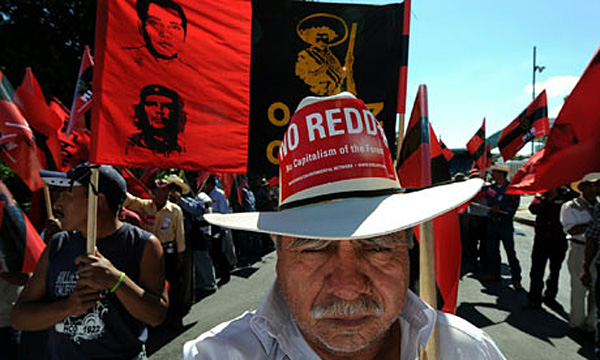
|  |  |  Editorials | Issues Editorials | Issues  
The Peasant View of Cancún Talks: 'They Want to Turn the Air Into a Commodity'
 John Vidal - Guardian UK John Vidal - Guardian UK
go to original
December 08, 2010


| | Cancun COP16: Peasants march during a demonstration, MDG Peasants march in Cancún outside the UN climate change summit. (Juan Barreto/AFP/Getty Images) |  |
Cancún is this week a city of buses. Every day several hundred ferry 5,000 of the world's diplomats, businessmen and non-government groups to and from the centre of the burgeoning holiday city to the plush Moon Palace seaside resort 35km away from where the UN climate summit is being held.

Barely noticed, another 100 buses carrying almost 3,000 peasant farmers, indigenous people and social movements from 12 countries have arrived from all over Mexico and Latin America, converging in eight "caravans" on an old basketball court in one of the poorest parts of the city.

The groups of diplomats and peasants could not be more different. One pays up to $400 a night for hotel rooms overlooking a turquoise sea, the other earns in the region of $400 a year and camps on the concrete floor of the sports hall. Both claim to have solutions to the global climate crisis, but one eats lobster, the other beans.

Today, as the politicians got down to talks, the peasants marched peacefully in Cancún and rejected what they called the "false solutions" being proposed in the Moon Palace.

"What they are proposing is good only for capitalists. Capitalism has caused climate change and now it wants to make new business from it. They want to turn the air into a commodity. They want to put a price tag on everything," says Luis Gomes de Maura of the Brazilian landless workers' movement, Movimento dos Trabalhadores Rurais Sem Terra. "These are false solutions to climate change."

"Cancún has been a hard experience for the peasants," says Paul Nicholson, a Basque co-ordinator of Via Campesina, the international movement of peasant farmers which organised Cancún's alternative climate conference. The meeting will be addressed by President Evo Morales of Bolivia on Thursday and possibly by other Latin American leaders later this week.

"The caravans on their way to Cancún visited environmental damage points across Mexico. They have seen face-to-face the impact of climate change, droughts, water pollution, giant hydro-electric dams, land-grabbing, big mining and rampant urbanisation," says Nicholson.

"Our caravan was 25 buses and we were stopped and searched five times by the army and the police. We had Mayan priests but they were not even allowed to hold ceremonies at ancient sites," says human rights activist and author Niels Barmeyer, who lives in central Mexico and travelled with the peasants to Cancún.

"People here have experienced climate crisis much more than people living in cities. They have had their farming devastated by the import of cheap GM maize and now it's just not worth them growing maize in many places now. People are leaving the fields and going to the US."

"Now they are threatened by conservation," says Barmeyer. "There is deep concern at moves in the climate summit to establish a forest protection scheme called Redd (reduced emissions from deforestation). This would allow rich countries to offset their climate emissions by better protecting forests.

"Countries are trying to sell conservation of the forest in the name of climate change, but it's a ruse. In fact they are taking forests over from ancestral land and declaring them biosphere conservation reserves. People are being denied access to land they have used for centuries or are having water denied them by conservation."

They reject carbon trading schemes, biofuel crops, geo-engineering and solutions proposed by the World Bank. "Peasant agriculture not only contributes positively to the carbon balance of the planet, it employs 2.8 billion people and remains the best way to combat malnutrition," says Josie Riffaud, a French farmer.

"Our message is that peasant agriculture can feed the world population and contribute to cooling down the planet. We small farmers and indigenous peoples are in grave danger. We will disappear if things continue like this. Who will feed people then? Industrial farming only leads to more hunger and climate change." |

 |
|  |



